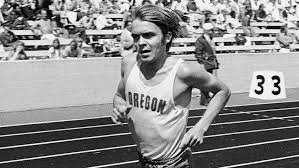In the history of American sports, there are few figures as compelling and transformative as Steve Prefontaine. Known simply as “Pre” to fans and fellow athletes, he wasn’t just a distance runner—he was a movement. With his unmatched drive, raw charisma, and uncompromising belief in effort over excuses, Prefontaine redefined long-distance running and helped usher it into the mainstream consciousness in the United States.
Humble Beginnings, Fierce Ambitions
Born in the coastal town of Coos Bay, Oregon, in 1951, Prefontaine came from modest beginnings. He wasn’t the fastest kid in school at first, but what he lacked in natural speed, he made up for in unrelenting work ethic and an unshakable competitive spirit. Under the guidance of high school coach Walt McClure, Prefontaine developed a love for pushing limits a theme that would define the rest of his career.
His talents soon drew national attention, and he was recruited to the University of Oregon, a program known for its legendary track tradition. There, under the coaching of Bill Bowerman the same man who co-founded Nike Prefontaine flourished. He became a collegiate sensation, capturing seven NCAA titles, including three in cross country and four in track and field.
Racing with Passion, Not Tactics
What made Prefontaine unique wasn’t just his success, but how he achieved it. In an era where distance runners often relied on strategic pacing and last-minute kicks, Prefontaine was different. He believed in leading from the front, running at full throttle, and daring his competitors to keep up. His approach was electrifying. Crowds were drawn to his gutsy, all-or-nothing style, making him a fan favorite across the country.
One of his most famous quotes captures his philosophy:
“Some people create with words or with music or with a brush and paints. I like to make something beautiful when I run. I like to make people stop and say, ‘I’ve never seen anyone run like that before.’”
A Voice for Athletes’ Rights
Prefontaine wasn’t just a fierce competitor; he was also an outspoken advocate for athlete empowerment. At the time, amateurism rules meant that athletes were not allowed to receive money, even though events, companies, and federations profited from their performances. Pre saw the injustice and wasn’t afraid to challenge the status quo.
He criticized the AAU (Amateur Athletic Union) and pushed for reforms that would allow athletes to be compensated and still compete, paving the way for the endorsement deals and sponsorships that are commonplace today. He even helped test early Nike prototypes, forming a close relationship with Bowerman and playing a quiet but pivotal role in Nike’s rise.
The 1972 Olympics and Unfinished Business
At just 21, Prefontaine competed in the 1972 Munich Olympics, finishing fourth in the 5,000 meters in a heartbreaking but valiant effort. Many believed it was only the beginning for him that he would return in 1976 stronger and more experienced.
But tragically, Steve Prefontaine’s life was cut short. On May 30, 1975, after attending a post-race party in Eugene, he died in a car accident. He was only 24 years old. The news sent shockwaves through the athletic community and beyond. The loss was more than just of a runner; it was of a cultural icon who represented integrity, passion, and the purest form of sport.
Legacy Beyond the Finish Line
Despite his brief life, Prefontaine’s legacy endures. His story has been told in multiple films, documentaries, and books. His face adorns murals and t-shirts, and his races are still studied for their intensity. The annual Prefontaine Classic, a premier international track meet held in Eugene, Oregon, stands as a tribute to his lasting impact on the sport.
Perhaps most significantly, Prefontaine ignited a running boom in America, inspiring thousands to lace up their shoes not just to win races, but to chase limits, to believe in effort, and to run with heart
Steve Prefontaine didn’t live to see the full fruits of his fight for athlete rights or the countless runners he inspired. But in his short time, he changed the game. He turned running into performance art, challenged broken systems, and proved that greatness isn’t always about medals sometimes, it’s about courage, conviction, and how deeply you’re willing to suffer for what you believe in.

